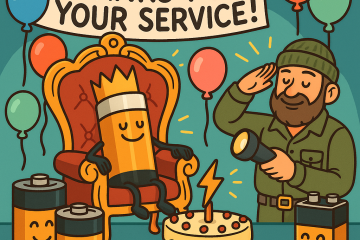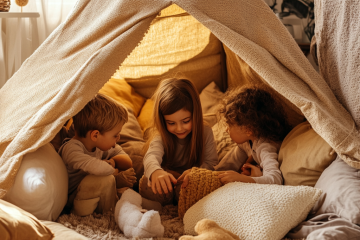Is Homeschooling Right for You?–by Guest Contributor Penni Batty
 There’s a whole lot of buzz about public school these days. As a home school mom of six children, I think I’ve probably heard every existing argument in favor of it, and yet, the more of these arguments I hear, the more opposed I am to public education. Why? Because most of these arguments defy logic and reason.
There’s a whole lot of buzz about public school these days. As a home school mom of six children, I think I’ve probably heard every existing argument in favor of it, and yet, the more of these arguments I hear, the more opposed I am to public education. Why? Because most of these arguments defy logic and reason.
Let’s look at the big one first—my pet peeve—the claim that the only acceptable place for your child to learn how to “socialize” is at public school. One reason I want to get this out of the way is that it’s really a non-issue. We learn to interact with others simply by being around others. Like every other useful thing, we learn by doing. We can learn social skills and mores where ever people are gathered: sporting events, cultural events, church events, classes, social gatherings…the list is as long as you choose to make it. Additionally, public school is not at all representative of a natural social setting; there is not another time or place in life where we are surrounded primarily by people our own age. We are far better served socially by interacting with people of all ages.
An additional reason to address this topic is that parents often fail to consider the quality of the social skills their children are learning in the public school setting. Do you really want your child to learn social behavior from children at, or below, their level of social experience? Perhaps it would be better for him or her to learn social skills from a mentor you choose in a setting which will allow that mentor to teach the values you have in common, the values and morals that have been eroded from the public education system in the interest of political correctness.
 Another argument in favor of public school is that keeping “good kids” in the system strengthens society as a whole. I have found that it generally works in the reverse. Putting good children, or children with high moral or educational standards, in bad situations tends to weaken their resolve to be “good.” Children who have to wait for other children to be disciplined or educated often get lost in the chaos, become bored or overwhelmed, and eventually lose the desire to perform above expectations. While this is not true of all children, there is an “equalizing” effect inherent in the system. When “good” children are reduced to the lowest common denominator of the system, the adults that come out of that system will determine the values of society as a whole, which will then also be reduced to the lowest common denominator.
Another argument in favor of public school is that keeping “good kids” in the system strengthens society as a whole. I have found that it generally works in the reverse. Putting good children, or children with high moral or educational standards, in bad situations tends to weaken their resolve to be “good.” Children who have to wait for other children to be disciplined or educated often get lost in the chaos, become bored or overwhelmed, and eventually lose the desire to perform above expectations. While this is not true of all children, there is an “equalizing” effect inherent in the system. When “good” children are reduced to the lowest common denominator of the system, the adults that come out of that system will determine the values of society as a whole, which will then also be reduced to the lowest common denominator.
I have heard the claim, “Public school is the best place for a child to get an education” more times than I want to think about. It’s almost as if we are automatons programed to think exactly that. The truth is that education in U.S. public schools has declined to an unacceptable level. U.S. students score far below students of other nations on standardized tests, and common core is not likely to help the situation. Where parents were once able to supplement instruction and help children gain a better understanding of subject material, under common core students will be left to the state, and the state alone, for instruction. This is a frightening scenario on too many levels to address in a short blog post and will have to be revisited at a later date. The truth about education is that public school is failing U.S. students educationally.
Yet another argument in favor of public education is that the teachers in our local schools are good people, our friends and neighbors, people we know well and trust to do what is in the best interest of our children. I will not try to argue that our friends and neighbors who happen to be public educators are bad people. I don’t believe that. I know too many good people who teach public school. I will, however, argue that those good people are required to take more classes about “education” than classes about any given subject, even when, as secondary educators, they are specializing in one specific subject. These good people are taught to believe in, trust, and teach flawed and failed methods. They are immersed in the dogma of the system and sincerely come to believe in the correctness of the principles. Even good people can be deceived.
And what about the educators who are not good people, the ones who hurt, abuse, and neglect the students they are supposed to teach and protect? Too many times they are protected, defended, and retained by teachers’ unions whose interests lie solely in power and control. Their job is not to protect, defend, or even educate children. They exist for the benefit of the adults, and they do their job much too well.
 In fact, far too much of the lives of public school children is out of the control of both the students and their parents. Someone else decides what they eat, when they eat, how much they eat, when they play, if they play, what they learn, when they learn it, how they learn it, what they wear, what they are exposed to, whether they are safe…I don’t know about you, but I am not willing to leave all of those things to chance, and I am certainly not willing to entrust those things to people who do not have the best interest of my children at heart. And I haven’t even touched on political indoctrination.
In fact, far too much of the lives of public school children is out of the control of both the students and their parents. Someone else decides what they eat, when they eat, how much they eat, when they play, if they play, what they learn, when they learn it, how they learn it, what they wear, what they are exposed to, whether they are safe…I don’t know about you, but I am not willing to leave all of those things to chance, and I am certainly not willing to entrust those things to people who do not have the best interest of my children at heart. And I haven’t even touched on political indoctrination.
Home education may not be right for you. It is the path God has told many of his children to walk, but it is certainly not right for everyone. However, considering the sacred nature of children and families, and considering the awesome responsibilities parents are required, by God, to shoulder, it seems fundamentally wrong to blindly accept the idea that public education is the only way to educate a child. There are many educational options available to families in the “information age.” We owe it to our children, and ourselves, to explore every available option before deciding that public school is the right, and the only, place for our children to obtain the education they need.
Preparedness Pro note: For those who are looking for good homeschooling tools, etc. here is a link to one that several of our homeschooling readers use to enhance their experience, Thomas Jefferson Education: http://www.tjed.org/simple-homeschool-bundle/ You can find them on Facebook too, supporting each other and bouncing off ideas here: https://www.facebook.com/groups/7KeysCert/



10 Comments
Desiree · June 15, 2014 at 12:52 am
AMEN and AMEN! I am so sick
AMEN and AMEN! I am so sick of the ‘socializing’ question!! Like I have any interest at all in my child socializing with most of what I see coming from the public school! And sadly there is not much of a difference in most of the churches I know. I love the new take you put on the whole socializing hub bub. I never thought of the fact that for the rest of their lives they rarely will spend time with just one age group. This was a fabulous article!
ChrisP · June 15, 2014 at 8:51 am
Amen, Amen, and Amen!!
Amen, Amen, and Amen!!
John Panagos · June 15, 2014 at 5:16 pm
I see public schools as a
I see public schools as a place to implant socialist views in our young people.
Trudi · June 15, 2014 at 10:17 pm
At the risk of sounding
At the risk of sounding redundant . . . . . AMEN! 😉 This was a great article, Penni. You hit the nail(s) on the head!
Kylie B · June 17, 2014 at 8:23 pm
I had a question, I am
I had a question, I am beginning to explore home schooling my 3 yo. I was wondering what type of curriculum you use for your children? or do you make your own curriculum any advice would be greatly appreciated.
Traci Luedtke · July 2, 2014 at 4:11 pm
I have home schooled all
I have home schooled all three of my children and always used Rainbow Resource Center as a place to get my curriculum. They have several options to choose, from going with one brand of curriculum like A Beka to hand picking each individual subject. I have hand picked all mine as I felt that one program for teaching all subjects didn’t meet the curiosity level for my kids as some subjects were boring. I have, however, used Saxon math all throughout and love it! As for my kids, my oldest graduated college with high honors and is now working as a medical assistant and wants to continue her education! My son graduated a year early from high school and is looking into continuing on with school. My youngest is now a sophomore in high school and will be graduating next spring, two years early and has plans to become a chef!!
Farmer's Wife · June 18, 2014 at 2:38 am
I homeschooled my 4 children
I homeschooled my 4 children in the 70’s and 80’s. Now I have 4 homeschooled grandkids who are also exceptional ! Their social skills were far above their publicly educated peers because they interacted with all ages of people through our home business.
Holly · June 24, 2014 at 12:14 am
Oh!!! And now I see this
Oh!!! And now I see this article posted (after I sent you the other video a few hours ago!) Great minds, I guess! 🙂
Jennie · July 5, 2014 at 10:39 pm
I agree wholeheartedly with
I agree wholeheartedly with this, and I am an educator. While I am not yet blessed to have my own children, I work in a public school and try to do what is best for all of my students. I must admit that this does not make me a popular person with my coworkers and administrators. It is exhausting, and I am constantly running home to my best friend for the emotional support to keep going back. She reminds me that God wants me in public education because of how I think and believe and the service that I offer those students who won’t get that anywhere else. But I have to admit that if and when I am blessed with children, I will stop fighting the corrupt system I work in and home-school my children.
That being said, for parents who cannot home-school their children for any of the myriad reasons that are individual to them, I do not blame or in any way despise them. But I hope against all hope that they supplement in their homes the love, moral guidance, training in compassion, and modeling in social skills (in the true sense) that they will not have access to while at school.
sharon king · July 5, 2014 at 11:55 pm
My 16 year old son and I
My 16 year old son and I want to walk across America. What would be a good suggestion on how to handle his high school years? Is there good online classes he could take?
Comments are closed.